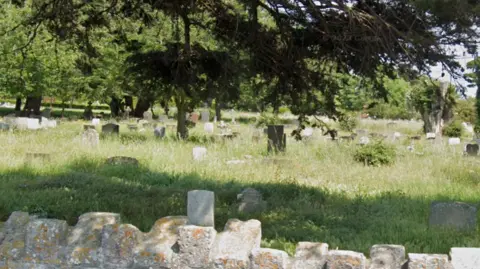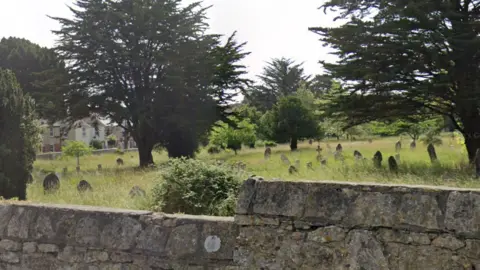Grieving relatives 'angry' over graveyard grass
 Google
GoogleGrieving relatives have said they feel "angry and betrayed" over a controversial scheme that sees grass left to grow long in graveyards.
The rewilding project in Weymouth, Dorset, which aims to encourage bees and butterflies to thrive in the town's cemeteries, is under review.
While some residents were in favour of the scheme, others have argued it is disrespectful to those that are buried there.
Weymouth Town Council is holding a consultation on whether the plans should be changed.
 Google
GoogleIn the summer months, grass in Melcombe Cemetery, Melcombe Extension, Weymouth Cemetery and Wyke Cemetery is cut to three different lengths, in line with guidance from Dorset Wildlife Trust.
Some areas are left long to create a wildflower meadow, some grass is cut to a medium length and others, such as pathways, are cut short.
Weymouth Town Council said it offered a "tranquil area" for people when they visited.
'Hard pill to swallow'
But Danny Whyte, who has friends and relatives buried in the cemeteries, said it was just a way for the council to save money.
"I've heard people complain that the graves cannot be found and relatives have left feeling angry and betrayed by the council," he said.
"It's hard enough going to pay respect to a friend or relative but to come face to face with an unkept cemetery, due to rewilding, is a hard pill to swallow."
Alan Clark, another Weymouth resident, said letting nature take over was "not what most people want to see".
"It may save the council a few pounds in maintenance but Weymouth is surrounded by rural areas where rewilding could easily take place without affecting anyone," he added.
'Beneficial for bees'
Others argued the scheme was important as it maintained habitats for wildlife.
Councillor Matt Bell, of the environment and services committee, said leaving some of grass to grow longer "allows wildflowers to grow which is beneficial for bees and butterflies".
“This is to increase biodiversity in the wider context of species decline and is not a cost-saving measure," he continued.
"It’s important to stress that the grass in the separate lawn areas of the cemeteries, where the most recent graves are positioned, is cut year-round."
The public consultation runs until 17:00 BST on 28 October.
The results will then be considered by Weymouth Town Council's environment and services committee.
You can follow BBC Dorset on Facebook, X (Twitter), or Instagram.
